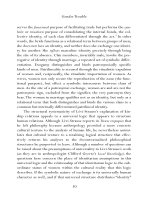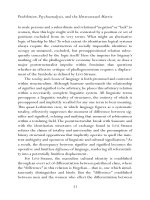GENDER TROUBLE 144
Bạn đang xem bản rút gọn của tài liệu. Xem và tải ngay bản đầy đủ của tài liệu tại đây (20.48 KB, 1 trang )
Subversive Bodily Acts
tion of the borders which divide the Symbolic from the semiotic. Just
as birth is understood to be a cathexis of instinctual drives for the purposes of a social teleology, so poetic production is conceived as the
site in which the split between instinct and representation exists in
culturally communicable form:
The speaker reaches this limit, this requisite of sociality, only by
virtue of a particular, discursive practice called “art.” A woman also
attains it (and in our society, especially) through the strange form of
split symbolization (threshold of language and instinctual drive, of
the “symbolic” and the “semiotic”) of which the act of giving birth
consists.11
Hence, for Kristeva, poetry and maternity represent privileged
practices within paternally sanctioned culture which permit a nonpsychotic experience of that heterogeneity and dependency characteristic
of the maternal terrain.These acts of poesis reveal an instinctual heterogeneity that subsequently exposes the repressed ground of the Symbolic, challenges the mastery of the univocal signifier, and diffuses the
autonomy of the subject who postures as their necessary ground. The
heterogeneity of drives operates culturally as a subversive strategy of
displacement, one which dislodges the hegemony of the paternal law
by releasing the repressed multiplicity interior to language itself.
Precisely because that instinctual heterogeneity must be re-presented
in and through the paternal law, it cannot defy the incest taboo altogether, but must remain within the most fragile regions of the
Symbolic. Obedient, then, to syntactical requirements, the poeticmaternal practices of displacing the paternal law always remain tenuously tethered to that law. Hence, a full-scale refusal of the Symbolic is
impossible, and a discourse of “emancipation,” for Kristeva, is out of
the question. At best, tactical subversions and displacements of the law
challenge its self-grounding presumption. But, once again, Kristeva
does not seriously challenge the structuralist assumption that the
prohibitive paternal law is foundational to culture itself. Hence, the
109









